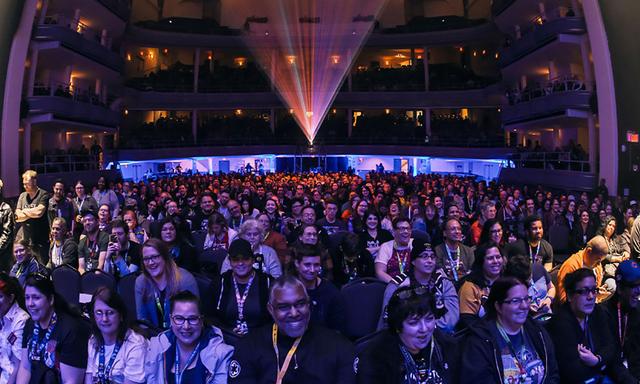If you click on a link and make a purchase we may receive a small commission. Read our editorial policy.
Mutant and proud! A discussion on the psychology of the X-Men from C2E2 2022
A dive into why the X-Men are important (and how)

One of the very first panels of this year's C2E2 was met with a nearly-full room of X-Men fans looking forward to a deep dive discussion about the X-Men, the psychology of X-Men, and why the X-Men are important.
The panel consisted of a bevy of industry and academic talent, featuring Dr. Eric Wesselmann, a psychology professor at Illinois State University (favorite X-Men is Cyclops); Victor Dandridge Jr. a comic creator and publisher from Columbus, Ohio (favorite X-Man is Gambit); Dr. Stanford Carpenter from the University of Chicago (favorite X-Man is Nightcrawler); and Cianna Greaves from WBEZ Chicago (whose favorite X-Man is Rogue). The panel was moderated by Dr. J Scott Jordon from Illinois State University (who's favorite X-Man is Wolverine/Logan).
The panel started with a discussion of the panelists' favorite X-Man moments from comics, the animated series, and even film. Wesselmann brought up a favorite moment of X-Men when Storm tells Nightcrawler that they're part of a family. Wesselmann pointed out that found family was not only a central theme of X-Men, but also a contrast to the fact that, before they had found each other, most of these characters had been loners, each fighting their own demons.

Speaking of demons, Stanford took a moment to aptly dissect the very literal image of Nightcrawler: "It's not just that he doesn’t fit in. His image is that of a demon. At the same time, he's a man of faith."
Stanford pointed out that Nightcrawler represents both "The struggle to be a man of faith when no one wants you to be" and "the struggle of trying to live and grow in the presence of stereotypes," drawing Kurt's personal challenge into something more universal, about how people need to navigate who they are and how people see them.
Continuing the conversation about Nightcrawler's psychology, Dandridge noted that Nightcrawler is actually very powerful but puts the effort to be a good guy. Stanford added that Nightcrawler is one of the only X-Men who "has already won the battle of being a better man."
As for the relationship between Nightcrawler and Storm, Greaves spoke about the important of Storm's presence as representation, especially in the light of the recent loss of Star Trek actor Nichelle Nichols. Greaves pointed out that in the live action films, Storm's character was diminished, and that what could have been "a much larger cultural moment" was wasted.
To share his own favorite X-Men moment, Jordon brought up Logan and the film Shane, and spoke to the importance of having a real discussion around "What it means to be a killer and what it means to be a government that sanctions and trains killers."
Jordon pointed out that violence cannot be brushed off of people's lives and how it is important to take it seriously, arguing that it is necessary to portray Wolverine in film with an R-rating to show the reality of what he does.
The panel then opened to audience questions and an invitation for audience members to share their own favorite X-Men. The audience named Destiny, Bobby Drake, Cyclops, Colossus, Cable, Rogue, and Elixir.
One audience member asked a question about the new X-Men introduction of Krakoa and the change in mutant themes now moving away from integration as a goal. Dandridge replied that another version of non-integration and a separate ingroup would be Wakanda. The conversation then turned to Magneto redefining the notion of crime and and 'evil' through his deep understanding of how the world works. Carpenter pointed out how in America, there's this idea of segmentation causing a "sense of threat," especially when its marginalized people gathering. On the other hand, there's this contrasting idea of the power of "ability to caucus." Carpenter shared that, "bringing all the mutants together, the assumption is that they would do the thing that we fear" and how unfair that assumption is.

Following this discussion about the grey areas of crime, an audience member asked the question, "What makes a good soldier?" which sparked a lively discussion in the panel.
Jordon, who was an officer in the military, pointed out that the question, even in its vocabulary, is complicated. What does "good" mean in this situation? He then brought up another question, "Is it really Logan that has a problem?" and directed the actual issue to the culture and the government around Logan.
Greaves pointed out that there's a complication even with the term 'soldier' and who is allowed to be considered a soldier— "One man's terrorist is another man's freedom fighter." She reminded the audience that people have starved themselves and gone on hunger strike for the label of political prisoner.
Jumping off of this dive into reality, another audience member asked what the panel thought would be Colossus' reaction if he were faced with Russia's current aggression in Ukraine. Jordon replied that, "He and Logan would have had a huge argument, and the X-Men would have ended up in Ukraine" Carpenter pointed out that when Colossus was created, Russia was a huge enemy of the United States, and that it was quite controversial, even moreso than he seems now, especially considering that Russia was considered "a threat to our lives."
Wesselmann broadened the conversation to a more individualistic approach, considering that Colossus would be trying to reconcile the identity of his country pride and how what the country he identifies with might do something he disagrees with, pointing out that this is an issue that happens to everyone and it is important to observe "how we sit in this ambiguity."
Dandridge replied that he wasn't sure know that Colossus would be against Russia's position, and that it has to do with "what part of the USSR he was from." Carpenter pointed out that Colossus came from the "breadbasket" which would include Ukraine. Dandridge agreed that if that were the case, Colossus would go to Ukraine without the X-Men to keep them out of muddying the politics.
Overall, this discussion felt like the best of an old school convention, where the conversation was about diving deep into the nitty gritty of something that everyone loves. What really stood out about this conversation was that it starts off with the premise that everyone in the room loved the X-Men and believe that they're important, but can then sit down and debate about why and how, enrinching the perspectives of not only the panelists, but also the audience members.
About C2E2 2022
Dates
-
Follow Popverse for upcoming event coverage and news
Find out how we conduct our review by reading our review policy
Let Popverse be your tour guide through the wilderness of pop culture
Sign in and let us help you find your new favorite thing.
















Comments
Want to join the discussion? Please activate your account first.
Visit Reedpop ID if you need to resend the confirmation email.